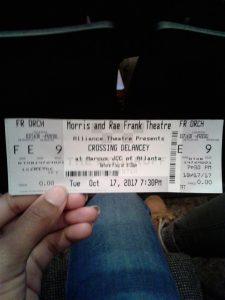After three hours of chasing down MARTA buses, forgetting play tickets, and interesting uber rides we (Faith and Rachel ) somehow managed to arrive an hour early at the Marcus Jewish Community Center of Atlanta for the showing of the Alliance Theatre on the Go’s Crossing Delancey. Exhausted from the day’s events we didn’t even consider looking up the plotline of the play and instead decided to kill the hour with a conversation about academics, pushy family members, and our loves lives, or more so our lack of ones. So imagine our surprise when the play unfolded to be a young Jewish bookstore owner, Izzy, and her attempt to find love with the unwanted help of her persistent grandmother and matchmaker friend. As the play continued we found ourselves in a pickle with a pickle man, a lonely bookstore owner, her Bubbie, an author, and a matchmaker.

Needless to say, the play, Crossing Delancey, captured our attention and nurtured our interest in generational differences on dating and marriage.
The stage lights turn on and immediately the audience is transported to the tiny home of Bubbie, the protagonist, Izzy’s, very bold and very Jewish grandmother. Right off the bat viewers can feel the endearing love that Izzy has for her eccentric grandmother, despite the conflicting viewpoints the two women discuss over baked goods at the kitchen table. As Izzy stuffs her mouth with Bubbie’s home-cooked delights she is subjected to the lecturing of her grandmother, who insists on getting her married off as soon as possible in order to protect her from the most horrible fate imaginable-life alone. As Bubbie’s speech progresses Izzy becomes continuously more amused until finally laughing in disbelief when her grandmother encourages her to go out on a blind-date a matchmaker set up for her with the local pickle man, Sam Posner. Right away Izzy counters her relative’s statement, defending the mindset of the modern woman’s take on marriage.

She argues that “It’s very different for women of my generation. . . . Everything’s different. We have options. . . . I can do anything I want to do. Go anywhere I want to go. . . . Maybe I don’t want a husband. . . And if I did, he wouldn’t be a pickle man.” Izzy’s statement stood out to us as a perfect representation of the generational gap present in terms of what marriage truly entails for millennials versus those born before. Whereas Izzy’s grandmother looks at marriage as a means for security, Izzy sees marriage as a unity between two souls made perfectly for each other, which is more along the lines of what today’s young adults are searching for in lifelong partners. Initially, Izzy looks down on the idea of a prospective suitor being someone invested in the business of pickles as it seems to contrast immensely from her passion for books and intellect. However, as the play progresses it is revealed that perhaps not all the ways we millennials go about the dating process are ideal. Crossing Delancey brings up differences regarding the options available to younger generations, the use of technology for dating, and expectations of marriage.
When examining Izzy’s previously mentioned statement there is one word that seems to stand out, “options”. People of our generation, Millennials, and even the generation after us, Generation Z, have far more dating options than our grandparents. We do not have to worry about one lost opportunity because we have plenty of fish to catch in the sea, which we can easily attain with one quick swipe right on our phone screens. Izzy just had Sam the pickle man and the author Tyler Moss, who we eventually learned was only interested in making her his assistant, but that could be more than others had near her. Because the play is set in the 80’s Izzy doesn’t take to any dating apps to talk to her potential suitors; however, we still noted the idea of “options” being translatable to technology today. Technology provides places like the internet with millions of users worldwide, which allow us to connect with numerous amounts of people who could be prospective companions. Dating apps, websites, and even social media are new places for people to meet and form relationships; however, prior to this people were limited to those that lived in close proximity to them. This meant that there were not many places where people could connect and thus convenience played a large factor in who people married at the time. This fact is depicted in the play when Bubbie goes on to describe how she married her late husband. He was ever persistent and had a good job so finally, she decided “why not?” and proceeded to date and eventually marry him. Because Bubbie grew up in a time where traditional male roles of providing for the household were expected, there is a conflict with the way she views marriage versus Izzy. Just like us, Izzy is living in a time of female progressivism and the idea of a woman providing for herself and marrying for love and not convenience has become normalized which Bubbie, just as some members of older generations, do not understand.
Living with immigrant parents that are a generation older, Faith has been acutely aware of these differences as she grew up. Growing up, Faith still remembers being confused about both her parents and her grandparent’s marriage situations. Her grandparents wed when her grandmother was only about fourteen or fifteen, but her grandfather was about thirty. Keep in mind that this was in Africa, and it was and in some places still is culturally acceptable. They basically still see marriage as a source of security. Faith’s grandpa owned a business so he could take care of her grandma, they lived in the same city, shared the same religion, and their families descended from the same tribe, which meant that they should be able to live together comfortably. Love was not the main priority because it could come with time. Faith’s parents married for similar reasons. As she grew up, it was clear that while her mom did want her to be in love with the person she married, Faith could tell based off what her mother said that she prioritized stability and security. Faith, however, is not necessarily worried about security and wants to marry her soulmate, which parallels Izzy’s desires exactly.

Another issue that we discovered is that the Millennials and the Baby Boomers are not looking for the same things when it comes to partners and marriage. According to Aziz Ansari and Eric Klinenberg in their book Modern Romance: An Investigation, in the past, people had companionate marriages: they were not necessarily about love, but convenience. Marriage used to be mainly about security; each person had clearly defined roles that would ensure that they produced a good family. For women, marriage meant more autonomy, since they were now only under the authority of their husbands. Since men worked, marrying a man that had a good job was necessary. They were just looking for someone that they could have kids and a stable life with. For men, marriage meant finding a nice girl to have kids with so that you could be the head of a household. In a survey taken in the 1960’s, they found that 76% of women would marry someone that they did not love as opposed to 35% of men (Ansari and Klinenberg 22). Now we are not just looking for these things alone, but we also want a soulmate. In the play, Izzy did not want to marry the pickle man because having a successful business was not enough for her. She wanted someone that she connected with on a deeper level, which is what she believed she would have with Tyler, the snobby author, based off what she read in his novels. Ever since the Women’s Movement, women no longer find themselves needing to rely on a man for stability. This means that it is no longer the biggest factor in pursuing a partner. In the 1980’s another survey was done and they found that 91% of women and 86% of men would not marry someone that they did not experience romantic love with (Ansari and Klinenberg 24). The people want true love and real connections. We found this especially interesting as the play takes place during the 80s where this shift of marital expectations is examined. After reflecting on the play and researching the causes and effects of generational gaps we began to ponder what we learned from this Out on the Town event.
We decided that dating in the twenty-first century can get complicated quickly. At first, it seems simple: Slide into said person’s DMs, swipe right on Tinder, create a profile on Christian Mingle, or just text the kid you like from your math class. While we do have so many options, so does everyone else, which makes finding a soulmate a long and tricky process. It makes us wonder whether or not the “old way” of thinking is all that bad, especially when considering Izzy ends up being with pickle man Sam by the end of the play.

Perhaps there is a lesson to be learned about convenience when we examine it from the viewpoint of lessening up on our dependency on technology to make connections. And maybe finding a soulmate who can provide security is not so bad if we view security as emotional and mental insurance as opposed to just economical protection. Lessening the generational gap could be possible if we viewed opinions and concepts from a different perspective and simply tried to understand one another. But going back to dating, if you find that you are still looking for love in your life, relax. Despite what Bubbie Kantor says, being alone does not make you sick. It could just mean that you are still in the process of searching for your soulmate, which in the end could make it all the more worthwhile.
Ansari, Aziz, and Eric Klinenberg. Modern Romance: An Investigation. Penguin Books, 2015.
